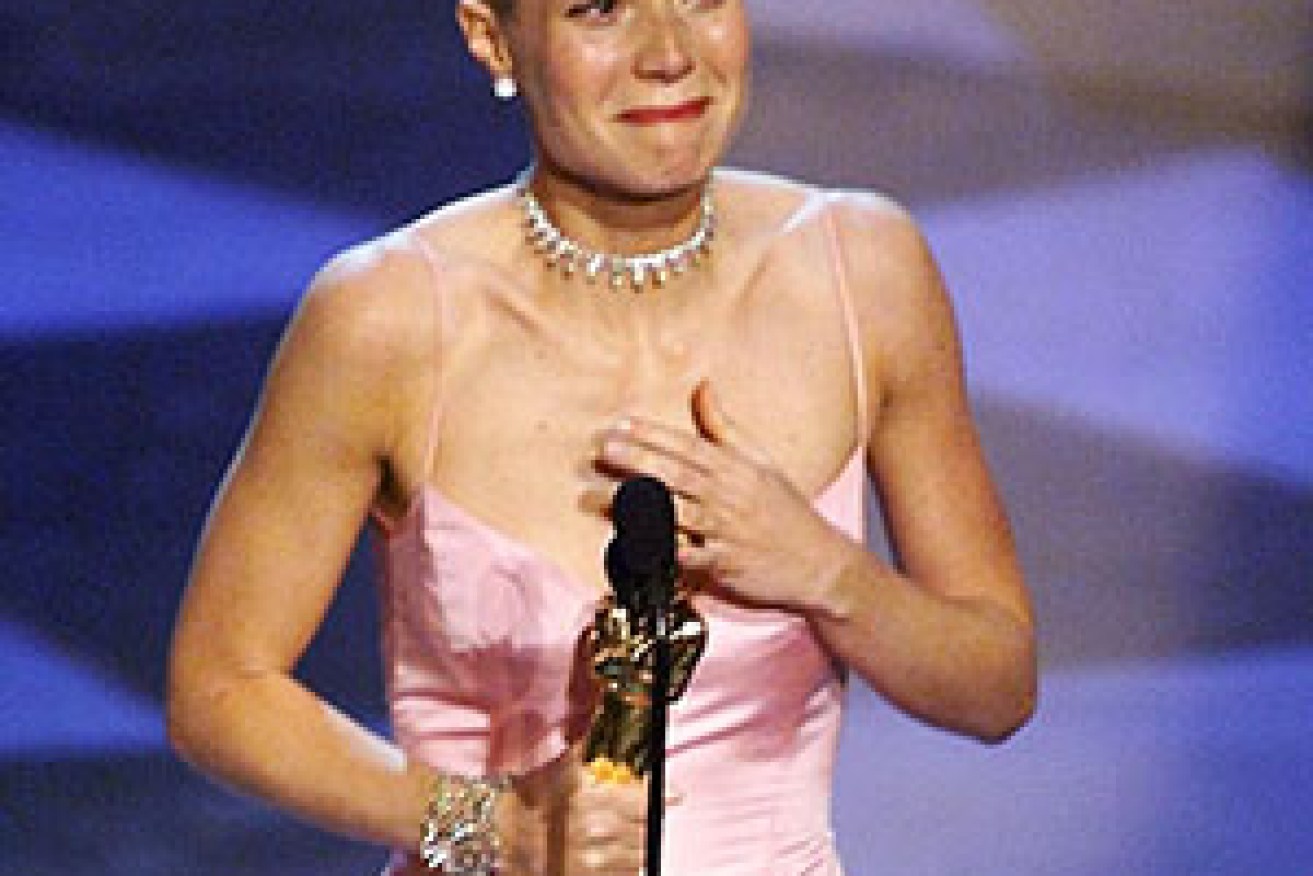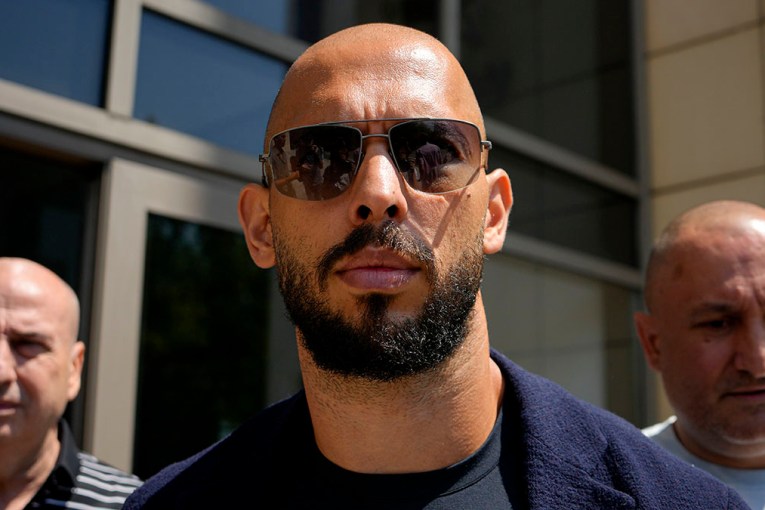When are actors acting?

'Strangler' ... Gwyneth Paltrow.
The New Daily will be covering the Golden Globes live on Monday from 10am. Visit our coverage for all the fashion, celebrity and movie news as it breaks.
The Golden Globe Awards kick off the heavy hitting ceremonies of the Hollywood awards season today. Whether on the winners podium, gracing the red carpet or starring in a film, the actors are superb performers. They may be so good, it’s hard to tell when they are being real or fake.
Actors are like lawyers, we pay them to be convincing when necessary. When they are really convincing we give them an Oscar.
Brisbane-based body language expert Allan Pease, from Pease International, says actors are basically professional liars.
“Actors are like lawyers, we pay them to be convincing when necessary,” Pease told The New Daily. “When they are really convincing we give them an Oscar.”
Pease says in order to tell if an actor is being sincere on the podium, there have to be “clusters” of indictors.
“The words we write convey fact, tone of voice gives meaning and body signals convey feeling,” he says.
“If a person is being sincere these three things are congruent. If they are not matching up that person is a fake.”
Psychologist Victoria Kasunic says it’s not just body language we need to examine. Our own ‘gut feeling’ is also a reasonably good compass for telling us what is genuine and what is just an act.
“We are programmed to connect and if something leaves you flat and feeling disconnected from the person, you might be looking at a fake,” Kasunic says.
So, we have a little test for you, while you watch stars like Cate Blanchett, Sandra Bullock and Tom Hanks at the Golden Globes (and the BAFTA’s, SAG’s and Academy Awards that will follow in the coming months). Look carefully to see whether their sentiments are real or whether they have cast themselves in a starring role of their own lives.
Here are some of the more common physical clues to look for as the speeches pour out in 2014.
Palm To Chest
This gesture can mean ‘seeking to be believed’ which can appear fake or it can mean real sincerity.
Pease says a hand on the heart shows people they are swearing on their heart.
“What you have to look for is the other signals that are happening at the same time,” he explains. “So if you have a hand on your heart but you have a wry smile the person will look at the smile.”
Jennifer Lawrence put her hand on her heart when she won the SAG Award for Best Actress in 2013. She did it again when she won the Oscar for Best Actress. Adding to her overall realness was the fall up the Oscar stairs and the casual ‘thanks’ at the end.
This contrasted with the unmemorable textbook-perfect speech of the 2013 best supporting actress award, Anne Hathaway. She even made a high-pitched comment to the statue. “It came true.”
So fake.

‘Strangler’ … Gwyneth Paltrow.
Strangling The Statue
Making an Oscar acceptance speech would be intense and possibly nerve-wracking. So clutching something with both hands can mean ‘At last! I have the thing I always wanted.’ Or it’s a typical sign of fear.
Hanging onto something with two hands is a form of self protection. Nervous or scared. Hanging onto an Oscar with two hands chances are that person is extremely nervous.
Pease says the majority of actors he has worked with in his role as chief executive at Pease International have a low self-image.
“The better actor they are, the lower the self image. Same goes for comedians: the funnier they are on stage, the more morose and down they are off stage. They’re acting. It’s a sad truth.”
Playing With Ears
The speech Robert Downey Jr gave after winning the Golden Globe for his Sherlock Holmes role was perfectly performed to appear confidently off-the-cuff. But that tug on the ear at 1’46” is an indicator of self-comforting and indecision. He ripped into a few people so maybe he questioned if he had gone too far.
“This is what we call a leak. An actor has practised their speech perfectly but those small gestures show that they are not completely confident about what you are saying.”

Was Sean Penn unimpressed with having to make a speech? Photo:Getty
The Eyes Have It
Avoiding eye contact is the most common sign of lying in western culture. But direct eye contact can go either way. It’s a sign of honesty – or faked honesty.
Peering over spectacles can indicate scrutiny or contempt. When Sean Penn won the Oscar for his role in Milk, he constantly stared down at his notes and looked over his spectacles at the crowd. This could be due to impaired vision but Penn famously avoided award shows most of his acting career and despite his award winning talent, he doesn’t call on it to conceal his real emotion.
Kristen Stewart won a People’s Choice award at the height of her Twilight fame and had no eye contact with the audience as she told us how exciting it was to be at the event. Her fake excitement was further exposed as she fumbled over her words and made a stunningly rapid escape from the stage. ‘Ahh umm I-I-I’ [tiny awkward laugh] I’m gonna get out of here, ok, bye.’
The Smile
A frozen smile with the blinking eyes of disbelief is what we often see on the nominees’ faces when they haven’t won. Psychologist Victoria Kasunic explains.
‘Most of us can pick a fake smile when we see one. A genuine smile has to reach the eyes and it does this because chemically, something happens in the body. Serotonin is released and this reflects in the eyes. A real smile is very hard to fake at eye level.’
The genuine grin is known as the Duchenne smile and is evident in the crinkled, sparkly eyes of Indian actress Aishwarya Rai. It’s beautifully spontaneous.
Then there are those poor, authentic smiles that always appear fake because they can’t fight against those vats of Hollywood botox and filler.
Body Language
If you see a star smiling for the cameras but gripping their upper arms – that’s a sign they may be insecure and faking confidence. It’s a contrdiction to the smile on their face.
Actors can say they are truly humbled to win an award but a telltale sign of real humility is to bend over. Two-time Oscar winner Cristoph Waltz bowed to the audience at the end of both his acceptance speeches.

Christoph Waltz bows to the audience while accepting his Best Supporting Actor Academy Award in 2013. Photo: Getty
Oscar-winning actor Angelina Jolie also showed real emotion, and was incredibly moving, when she received the Jean Hersholt Humanitarian Award recently.
The open palm gesture is also a classic sales tool to indicate ‘you can trust me, I have nothing to hide’. Ashton Kutcher does this perfectly at the Teen Choice Awards but then spoils his realness by manically scratching one side of his face.
Non-visual clues
Kasunic sums up a major non-visual clue that separates the real from the fake. ‘It’s how you feel when you’re listening to them. When someone speaks from the heart, do you feel touched and moved? Usually that’s a strong, intuitive sign that you are witnessing something genuine.’
Possibly the best is-it-real-or-is-it-fake acceptance speeches is by Will Ferrell who drops and smashes his Mark Twain Comedy Award. His subsequent ramble is so powerful and so real in its paradoxically rehearsed spontaneity.
It is eclipsed by perhaps only one other award acceptance in history. Roberto Benigni won the Oscar for directing Life Is Beautiful and his response was supremely authentic. Every gesture expressed his pure joy and we all felt it too. His version of jumping onto the backs of chairs and leaping over people sits in stark contrast to Tom Cruise’s couching-jumping on the Oprah show.
It’s an amusing irony that Tom Cruise is so believable when he performs on screen yet so doubted when he plays himself in real life. Perhaps ‘playing’ himself is the problem.
There’s an old saying – ‘If you can fake sincerity, you got it made’. And in this day and age, anyone can be a fake but it’s the real ones we love most.
With Antonia Acott








